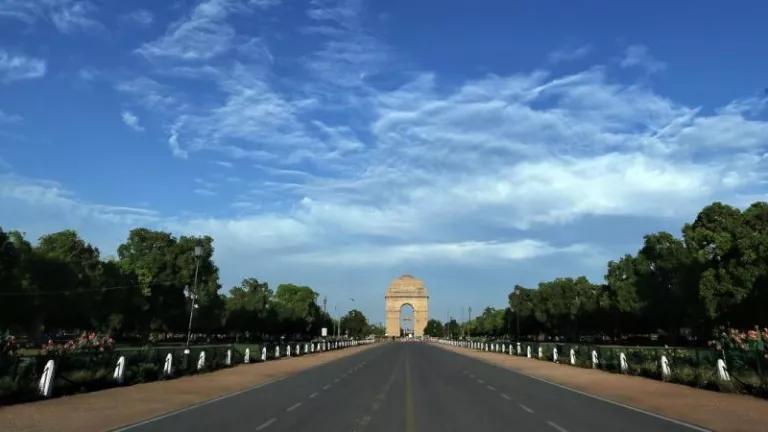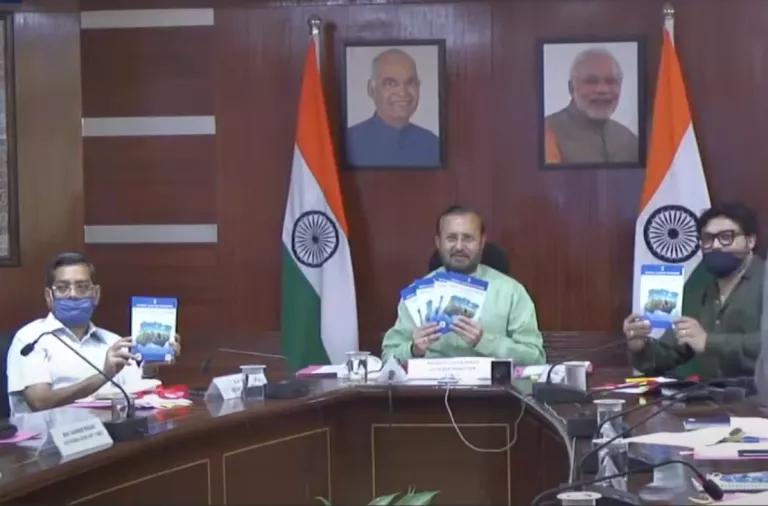
Co-authored with Polash Mukerjee
With experts calling on government officials in New Delhi to take action on winter air pollution and the implications on COVID-19, the recent International Day of Clean Air for Blue Skies offers direction. As part of the international discussions, the Government of India highlighted updates on the National Clean Air Plan and nearly 2,000 doctors said that air pollution is harmful to health and urged the government to prioritize public health in combating air pollution and COVID-19.
Blue skies at India Gate during COVID-19 lockdown. Image Credit: ANI
As part of the first ever, International Day of Clean Air for Blue Skies, the United Nations Environment Programme (UNEP), the Climate and Clean Air Coalition (CCAC) and the World Health Organization (WHO) held several international events emphasizing the role of clean air in achieving the Sustainable Development Goals. Many of the discussions were organized in India, including a day long Doctors for Clean Air Conclave organized by the Delhi-based Lung Care Foundation
Doctors for Clean Air Conclave
As discussed during the Doctors for Clean Air Conclave, clean air and blue skies are more urgent for polluted cities around the world, including in India, given the global pandemic. The doctors explained that among the people most likely to die from the coronavirus are those who suffer from lung diseases, heart troubles, and related ailments worsened by air pollution. Scientific evidence has linked COVID-19 with air pollution in two main ways – pre-existing respiratory illnesses attributable to air pollution and higher concentrations of fine particulate matter.
In a survey among 2000 registrants for the conclave, 99.5% of the respondents said “air pollution is hazardous to our health.” Over 96.9% of the respondents said that “the Government should prioritize the health of the citizens by ensuring clean air for all as we recover from COVID-19.”
Dr. Arvind Kumar, Founder and Manager Trustee of the Lung Care Foundation said, "Air pollution not only has long-term health impacts on us but also makes people living in the polluted city more vulnerable to infectious diseases such as COVID-19 by reducing their immunity and damaging their organs. We must focus on having clean air for the health and wellbeing of our citizens and future generations."
Dr. Maria Neira, Director, WHO said, “Health professionals have a duty of care, and they take up a trusted position in society. That is why I’m so excited to see Doctors for Clean Air grow so fast, to over 200,000 doctors across the country, adding thousands of trusted voices to our race for a cleaner and healthier India.”
Key Events Government and NGO Events
Along with the Doctors for Clean Air Conclave, there were several other discussions organized, including a meeting of India’s Ministry of Environment, Forests & Climate Change (MoEF&CC) leaders – Minister Prakash Javadekar, Minister Babul Supriyo and Secretary R.P. Gupta. During the online meeting, the officials discussed progress on India’s National Clean Air Programme (NCAP) and updates from the Central Pollution Control Board and Municipal Commissioners of non-attainment cities. The meeting was live streamed on youtube.

MOEFCC Discussion on National Clean Air Plan. Image Credit: MoEF&CC
The Indian Institute of Delhi’s (IITD) Centre of Excellence for Research on Clean Air (CERCA) also organized a webinar on the topic of “Clean Air Goals for India: What did we achieve and where should we go?”. It included discussants from scientists, epidemiologists as well as civil society groups.
The National Institute of Science, Technology and Development Studies (CSIR-NISTADS) also organized a Policy Dialogue on Air Pollution Implementation Strategies with a discussion on Comprehensive Technology Policy exchange through collective intelligence.
The WHO also launched a series of information videos with air quality experts, epidemiologists and global leaders answering important questions on air quality and health. The experts interviewed in the online collection include Gina McCarthy, President NRDC and former U.S. EPA Administrator and, who spoke on environment justice and the need to create healthy cities while she was at the Harvard T.H. Chan School of Public Health.

The NCAP's city-level action plans aim to strengthen action on air quality management. With the upcoming winter air pollution season, NRDC is working with partners in Ahmedabad, Pune and New Delhi on advancing actions to reduce air pollution – including a pre-Diwali webinar in October 2020. As International Day of Clean Air for Blue Skies emphasized governments, scientists, doctors and civil society organizations need to come together to prioritize clean air and public health to build sustainable and healthy communities.
Polash Mukerjee is a clean air expert with NRDC based as a consultant in New Delhi.
